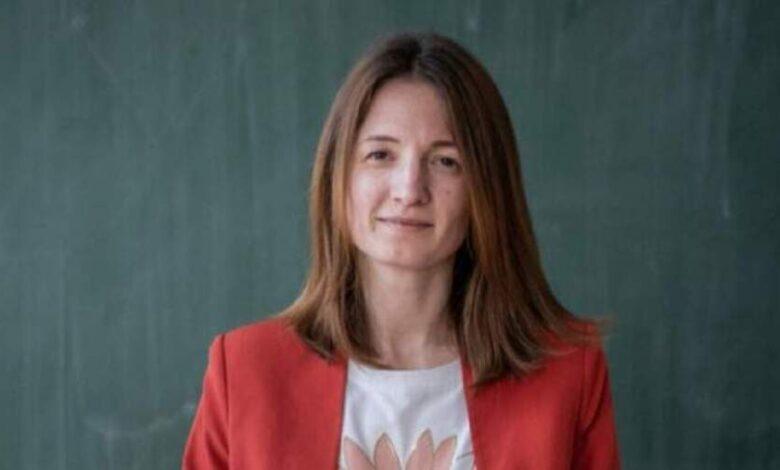“According to forecasts, in 2027 there will be 570 thousand children aged 1-6 years in Ukraine. We have never had such a catastrophe”: Deputy Minister of Education and Science

Preschool education in Ukraine is on the brink of major changes that have become a response to today’s challenges — a full-scale war, a rapid decline in the birth rate, the destruction of educational institutions, and the need to provide children with access to quality preschool education under any conditions. Today, when the majority of children in Ukraine are forced to study online or live under the constant threat of shelling, the issue of socialization and access to a safe and quality preschool environment has become extremely acute. However, the biggest problem that will determine the future of the country for years to come is the rapid decline in the number of children.
About the problems of preschool education told Anastasia Konovalova, Deputy Minister of Education and Science of Ukraine for preschool education. Over the past thirty years, the content of preschool education has been updated in one way or another, but the organizational system has remained almost unchanged. The previous law on preschool education was adopted back in 2001. As Anastasia Konovalova noted, everything has changed during this time — the country, the economy, the world itself. That is why the new law, which entered into force on January 1, 2025, aims to bring the preschool education system in line with the new reality.
Anastasia Konovalova emphasized that now there are slightly more than 750,000 children in the preschool education system, of which 168,000 are receiving education in a mixed or distance format. She separately emphasized the importance of this number, because in fact most of these children do not physically attend kindergartens. According to her, no matter how diligent educators are, it is practically impossible to implement one of the key functions of preschool education — the development of social-emotional intelligence — in a remote format.
The deputy minister noted that socialization is possible not only in a preschool education institution – a child can communicate with other children on the street or on the playground. But very often, children who are in online education do not even go outside, because they live in constantly bombarded areas. In principle, they have no contact with their peers. According to Anastasia Konovalova, studies already today show that children in the frontline regions have these socio-emotional skills significantly. And then such children go to a school that also works online, and they are completely unprepared for school life – they do not understand that there are rules, that there are different children, that sometimes you have to wait your turn. These are basic things that are formed precisely in the team, in kindergarten.
Anastasia Konovalova explained that the current coverage of children in preschool education does not look bad – according to the Ministry of Justice of Ukraine, there are currently 881,000 children aged one to six in the country. But this figure does not reflect the real picture. She emphasized that with such numbers, there should be a queue for kindergartens, however, if you go outside Kyiv, you can see that many kindergartens are already underfilled today.
In Kyiv, the queue is maintained only at certain institutions. According to Anastasia Konovalova, if the parents are ready not to choose a specific institution, but to send the child to the place where there is a place, then today you can submit an application, and tomorrow you can bring the child to kindergarten, even without benefits. She emphasized that such a situation has arisen in Kyiv for the first time in history. To a large extent, this became possible thanks to the city’s “Money Follows the Child” program, which provides monetary compensation to parents for paying for a child’s stay in a private kindergarten. According to the deputy minister, as a result of this program, a large number of private kindergartens were opened, and they partly took on this burden.
By the end of 2022, there were almost half a hundred establishments in private and corporate ownership operating in Kyiv, a total of 131 establishments. But, as Anastasia Konovalova emphasized, the problem now is not to find a place in a kindergarten. She separately focused on the state of the communal network of preschool institutions. Currently, there are 11,804 institutions operating in Ukraine in one or another format. As of the beginning of February 2025, 129 preschool education institutions were destroyed, another 1,237 were damaged. At the same time, shelters have only 8,181 kindergartens.
Anastasia Konovalova emphasized that every year the Ministry asks for subvention for the construction of shelters in kindergartens. Last year, funds were given only for schools, this year they plan to submit a request, but there is no certainty that it will be granted. She emphasized that we should be aware of the reality in which we live.
According to the deputy minister, the problem of building shelters in kindergartens is the cost. If you build a shelter for a school, a huge hole is dug for one and a half thousand children. And in the kindergarten, the hole is a little smaller, but the costs reach at least 200,000 dollars for 150 children. And at the same time, the number of children in kindergartens is constantly decreasing.
In addition, Anastasia Konovalova stated:
“According to forecasts, in 2027 there will be 570,000 children aged 1-6 in Ukraine. This indicator has been gradually decreasing for the first time, but we have never had such a disaster. That is, children who were born during the COVID-19 pandemic and a full-scale war have now gone to kindergartens. And during this period, such zealous families were born. And thank God that we have them. But this demographic gap requires a large system flexibility, so that we can maintain the service and the network. This flexibility was not there before, and this is what the reform of preschool education should add. And the Law “On preschool education”, which came into force on January 1, 2025.
Anastasia Konovalova said that the reform is designed to enable the system to adapt, not just to survive, but to provide children with access to quality education. The essence of the reform is that the system has not changed organizationally for thirty years. Previously, there was a large kindergarten or nothing at all, at most a preschool unit attached to the school. Now there are many new types of kindergartens.
She emphasized that the law provides an opportunity to attract additional finances through paid services, as well as to additionally increase salaries in the sector even within the existing budget.
“How we used to be: either there is a large kindergarten, or there is none, and there is nothing in between, at most a preschool unit attached to the school. Now there are many new types of kindergartens. This is on the one hand. On the other hand, the law provides an opportunity for additional funding through paid services and additional salary increases in the sector. Even with the budget we currently have. Because communities spend UAH 54 billion a year on preschool education. On average, it is UAH 5,300 per child.
But where does this money go? Do they pay for the work of specialists who work directly with children? Are they directed to the fact that we have beautiful flower beds in the garden? Do children receive enough methodical support? What do we finance? And this reform prioritizes the funding of teachers. Therefore, the law contains such important innovations that regulate the burden on the educator. Next will be a new staff list. It’s a priority.” – believes the deputy minister.
Anastasia Konovalova said that the community decides for itself whether to leave a staff unit or to transfer a certain service to outsourcing. She gave the example of Kryvyi Rih, where there are no guards in the kindergartens, instead, video surveillance and alarms have been installed. Or there are examples when the kitchen works for several establishments and delivers food. She emphasized that it is also possible to save on this in order to increase the salary of educators.
“Yes, mobile kindergartens will appear in Ukraine. This is a specially equipped bus that has all the necessary materials for preschool education and active leisure time. It regularly visits settlements where kindergartens do not work, stopping in safe places near shelters. But this is the last straw, and we write about this in the regulations on this type of preschool education organization: if you can’t do anything at all, then make a mobile kindergarten until the moment when you will be able to open at least a preschool department, for example, at the library.
A mobile kindergarten is a way out where there are no teachers, because everyone, let’s say, has left. And then mobile teams can work. Why was it important to write it down? So that the travel is taken into account in the teaching load, and not like this: teachers travel for three hours to work with children for an hour, and they are paid only for this hour, I say conditionally.” – explained Anastasia Konovalova.
She also reported on a new approach to the creation of preschool units — now they can be opened not only at schools, but also at libraries or other institutions. This makes it possible to open small groups for even six children in small villages.
Anastasia Konovalova concluded that the essence of the reform is flexibility. One communal kindergarten will be able to work as an umbrella — have a nursery, kindergarten, mini-kindergarten or a mobile team in its composition. She emphasized that mobile gardens will not become a mass phenomenon – they are a solution for emergency situations.
The main forms remain nurseries and ordinary gardens. According to Anastasia Konovalova, it is this system that will preserve preschool education and ensure children’s access to quality education even in the most difficult conditions.





